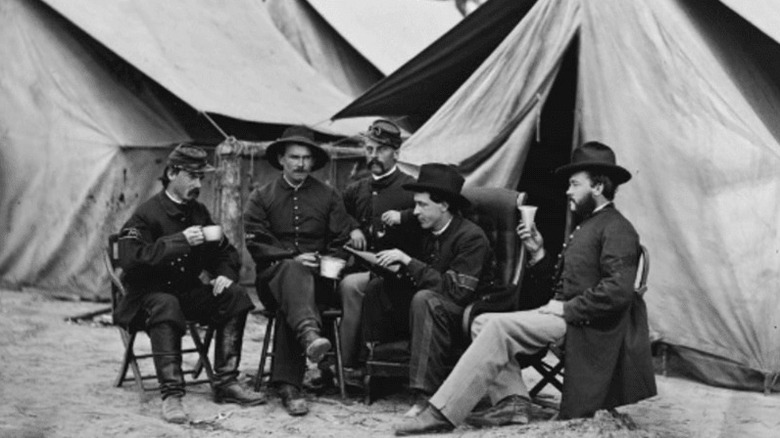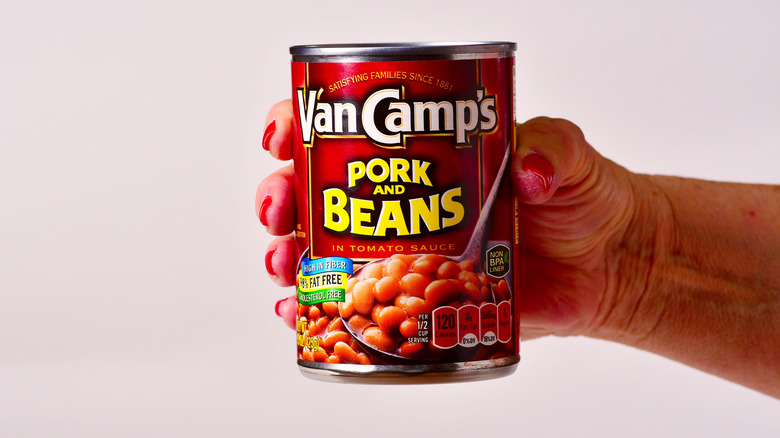The Canned Rations Fed To Soldiers During The Civil War
The Union's victory in the American Civil War has been attributed to the bright minds of leaders like General Ulysses S. Grant and President Abraham Lincoln, but perhaps the most powerful force in determining the nation's fate was its food. According to NPR, a significant imbalance in available rations was critical to the ultimate outcome of the Civil War. Union blockades prevented the Confederate forces from acquiring staples such as coffee and flour, and food shortages ultimately plagued the South for the duration of the war. Circumstances were better for the Union Army, but in the midst of war, "better" didn't mean much.
The Union soldiers did have access to coffee (in fact, former President William McKinley gained notoriety for making a heroic coffee run during the Battle of Antietam), but their food was hardly appealing. Per NPR, their rations consisted largely of salt pork and hardtack, which were frequently infested with insects. Timelines adds that Worcestershire sauce became popular with soldiers as a way to disguise the taste of spoiled meat. However, Civil War soldiers did fare better than the veterans of earlier wars because they had access to a relatively new technology, one that changed the nature of food preservation for everyone: canning.
Canned goods were popularized by the war
Today, you probably think of canned goods in relation to camping trips, food drives, and home canning of jams and sauces, but this technology was born under the darkest of circumstances. The canning process is the brainchild of French inventor Nicolas Appert, who came up with it in 1809. Appert was responding to a plea from the French government asking for civilians to help them find a way to preserve food for the military during the violence of the French Revolution (via Britannica). The close ties between canned goods and warfare continued into the American Civil War half a century later, at which point other innovative minds were exploring the full potential of canning.
Perhaps the most notable canned good to emerge from the Civil War is condensed milk. According to MIT, the process for condensing and canning milk was patented by Dr. Gail Borden of Connecticut in 1853. Borden had previously experimented with such varied inventions as amphibious vehicles and refrigeration, but when it came to condensed milk, his timing was perfect. Per Timelines, condensed milk was so valued by soldiers during the Civil War that Borden couldn't keep up with demand and had to sell licenses to other dairy companies allowing them to use his patented process.
War was a boon to Northern food industry
Milk wasn't the only canned good that became prominent during the Civil War. According to Timelines, the conflict was also instrumental in popularizing canned fruit and meat. The powerful American beef industry experienced a major surge in Chicago, where businessmen Gustavus Swift and P.D. Armour each opened massive slaughterhouses they referred to as "disassembly plants," hiring every butcher they could find in the area to produce canned beef for Union soldiers. Per Nebraska Public Media, this represented the birth of the modern American meatpacking industry.
Meanwhile, in Indianapolis, Gilbert Van Camp was also cashing in on the massive demand created by the Civil War. According to Indiana Humanities, Van Camp, a former tinsmith, began canning fruits and vegetables in 1861. He was also the innovator of canned pork and beans, perhaps the most classic of all tinned meals. Like the meatpackers of Chicago, Van Camp secured a lucrative contract with the federal government to supply food for the Union Army. Van Camp's Pork and Beans, as well as Gail Borden's Borden Dairy, are still going strong today.


